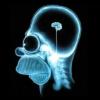Interesting observations. I'd love to start his muscle building program(s), but it may be heard for me to get in 4-5k calories without resorting to heavy whipping cream or simply eating tons of carbs every day. Now, I'm really trying to add nutrient dense foods into my diet, because even after adopting an ancestral-style diet, I never added them in, simply excluded lots of toxins; now I'm adding in chicken livers, gizzards, backs, feet, and I should be receiving some Deer organ meats from my fiances step father - hopefully liver, kidney, and heart. Most of which aren't too calorie dense.
I'm just not certain on what's optimal, but I suppose it is entirely individual, hence why I want 23andMe and Organic Acid Testing done on myself. I was reading some portions of Vilhaljmur Steffanson's books, and he actually cited the Inuit eating carbs even in winter - keep in mind this is POLAR winter. They ate berries, found in ground starchy foods, twig-like foods, digested carbs in animals and fish, and so on.
I wonder if that is at least partly why it has been used with success in diabetic patients. If ketosis is stressful and solely mimics the starvation processes (which it does, but as far as I can tell that isn't necessarily a bad thing - activates chaperone mediated autophagy, among other interesting things), it seems as though fructose would be the best way to maintain adequate metabolic 'efficiency' (not damaging your beta-cells, maintaining low(er) blood glucose, increasing RMR, producing CO2, NADPH, etc.), along with adequate use of other glyconutrients such as galactose, d-ribose, xylose, xylitol, and so on.
Yeah, to get up to 4-5K calories I made 2 1200cal shakes with protein powder, raw milk, and raw egg yolks, plus 9 total TBSP of MCT a day (in the shakes). I had those in addition to my regular (high-calorie) meals. It took me two weeks to not feel utterly discombobulated after consuming it all.
Regarding what is optimal... I think we, as omnivorous products of billions of years of evolution, probably do not have a single "optimal" environment. I think we probably have a mishmash of adaptations to a large number of environments and foods. Being adaptive requires maintaining the ability to switch from one environment to another without dying; hence, we are probably not perfectly suited to any one thing.
Therefore, I think that the ketosis strategy and the PHD-style moderate carb strategy are both valid, and their ultimate success depends on individual geno/phenotype. (Both, however, are probably 100% better than the standard modern diet). Which is why I am curious about your organic acid testing. Could you tell me more about what that reveals?
Interesting LEF article from 2011 claiming that BCAAs cause mitochondrial biogenesis and complement PQQ and resveratrol.
http://www.lef.org/m..._Booster_01.htm
"A study recently published in the respected clinical journal Cell Metabolism4 reveals that branched chain amino acids (BCAAs) have the power to increase life span in part by inducing mitochondrial biogenesis—the spontaneous generation of new mitochondria.
In this article, the results of this study are detailed. BCAAs may complement the life span effects of both pyrroloquinoline quinone (PQQ) and resveratrol.5-7
Specifically, BCAAs may trigger cellular mechanisms that enhance mitochondrial number and function while also upregulating expression of the pro-longevity gene that resveratrol targets: sirtuin-1!1,6,7"
Resveratrol + Equol
"Collectively, these data demonstrate that the combination of two known natural products, resveratrol and equol exerts a synergistic effect on mitochondrial function because stimulates the mitochondrial biogenesis more than the single compounds alone."
http://www.ncbi.nlm....les/PMC3750512/
CoQ10+Alpha-Lipoic Acid also induce mitochondrial biogenesis (via the PGC1-alpha signal pathway, as the study I reported in the other thread describes).
So here are some questions I think we should be asking before we go all-out on the mitochondrial biogenesis project:
1. What are the downsides of having more mitochondria? That is,
why wouldn't we have had them in the first place via evolution? Is a greater requirement for energy & nutrients the only reason (though admittedly it is a serious one), or might there be others more sinister?
2. If there are serious downsides to a multiplication of mitochondria, can we control them? How?
3. To what degree can the number of mitochondria be increased? 10%? 100%?
4. To what degree does this ramp up ATP production?
5. What happens if you suddenly have way more ATP than you did before? Can the body actually use it? Would it mostly be used in situations of high stress or need (like strength-training or cognitive stress) or does it provide more energy for better functioning all the time?
6. What effects other than ATP generation occur through mitochondrial biogenesis?
7. What is the nature of the new mitochondria being created? There is more than one type, I believe.
Has anyone read any studies or tried doing this on your heart / lungs / cock & or balls ? Seriously, I'm curious to try this but I may have to buy several 96 LED units to cover the entire cawk. Ok really serious has anyone tried any of these?
I believe there was a study earlier in the thread on rodent testicles (resulting in testosterone production), but I don't know about heart or lungs. Considering that the LEDs can only penetrate about 2 inches into tissue, I doubt they would reach many internal organs.
Edited by AscendantMind, 01 November 2013 - 04:11 PM.






















































